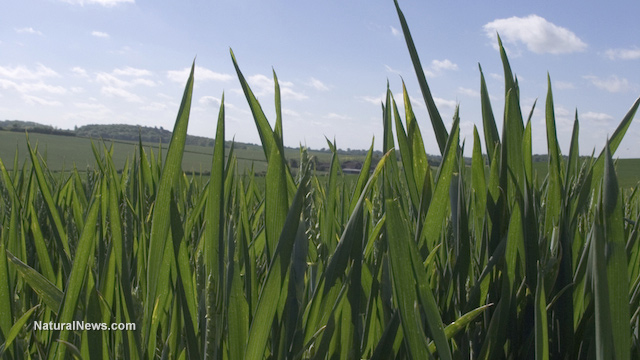African farmers fight against Gates Foundation's attempts to implement ecologically destructive industrial agriculture
Tuesday, October 14, 2014 by: Julie Wilson staff writer
Tags: Gates Foundation, African farmers, industrial agriculture

- Russia escalates censorship war, targets over 200 VPN apps amid Google resistance
- Mel Gibson sparks outcry over 9/11 ‘Biggest Scandal’ remark as unanswered questions resurface
- BIRD FLU ZOMBIE APOCALYPSE: Injected humans to become SPIKE PRION FACTORIES due to “replicon” technology in the upcoming mRNA "vaccines"
- Surge in KIDNEY FAILURES linked to common medications
- DMSO: Nature's healing solvent with revolutionary potential - from cancer treatment to regenerative medicine
- Massachusetts pediatrician conscripts law enforcement, unleashes nationwide manhunt for Fitchburg family-of-five who declined vaccinations for their healthy kids
- North Dakota town exposes Big Fluoride and Big Government corruption in federal water poisoning scheme
- Aerosolized bioweapons? Strange “diploid biomasses” falling out of the sky in Florida captured under the microscope
- Big Tech accused of $278 billion tax underpayment over the past decade
- Major baby food brands exceed California lead limits, risking children’s health
- Germany's gold dilemma: Urgent calls to audit U.S.-held reserves amid political tensions
- Fauci is back in the limelight, and he’s busy promoting a future COVID or FLU pandemic
- Daniel Estulin’s “Tavistock Institute: Social Engineering the Masses” reveals the organization’s hidden hand in social engineering
- Widespread social and economic unrest: Steve Quayle issues urgent financial warning of imminent asset collapse in new interview with Mike Adams
- How North Korea’s massive military aid is keeping Putin’s war machine running
- Trump’s surprise role in Japan trade talks signals new economic order
- Kiss Your Genetic Privacy Good-Bye! 23andMe Gets Green Light to Sell Your Intimate Genetic Details to Anyone They Want
- Trump's national security tariffs target semiconductors and pharmaceuticals amid supply chain shifts
- Aerosolized bioweapons? Strange “diploid biomasses” falling out of the sky in Florida captured under the microscope
- Analysis: The coming economic collapse, a mass uprising and Trump's three secret weapons to halt the growing revolt
- Israeli lobbyists boast of controlling US national security policy in leaked AIPAC audio
- Widespread social and economic unrest: Steve Quayle issues urgent financial warning of imminent asset collapse in new interview with Mike Adams
- Fauci is back in the limelight, and he’s busy promoting a future COVID or FLU pandemic
- Kiss Your Genetic Privacy Good-Bye! 23andMe Gets Green Light to Sell Your Intimate Genetic Details to Anyone They Want
- TAKE IT DOWN Act advances in Congress amid free speech concerns
- U.S. lawmakers investigate Meta over alleged China collaboration
- Mike Adams releases country western hit single: Goin’ Back in Time is Comin’ Home
- CLOT SHOT PLANDEMIC UNFOLDING: Fibrous, rubbery clots caused by covid injections have prion-like seeding activity
- Dane Wigington exposes climate engineering as ‘All-Out Weather and Biological Warfare’
- Tulsi Gabbard leads charge against the Biden regime’s global censorship of the 'Disinformation Dozen'
- Pfizer's RSV vaccine linked to preterm births as drug giant CONCEALED RISKS from pregnant women in unethical clinical trials
- Criminal referral requests filed against Fauci and top COVID officials in seven states
- Defunding DEADLY mRNA jabs: Government funding for mRNA technology being scrutinized and sidelined until proven "safe and effective" for real
- Curcumin’s ancient healing power supercharges muscle recovery, and its effects are compounded with anti-inflammatory foods and supplements
- Shedding light on the dark side of MMR vaccines: How vaccinated individuals SPREAD MEASLES & put the vulnerable at risk
- Government waste exposed: Hegseth supports Musk’s demand for accountability from federal workers
- Newly released JFK files reveal Pentagon's role in creating Lyme disease and covid in the same lab
- Analysis: The coming economic collapse, a mass uprising and Trump's three secret weapons to halt the growing revolt
- Aerosolized bioweapons? Strange “diploid biomasses” falling out of the sky in Florida captured under the microscope
- Mike Adams releases country western hit single: Goin’ Back in Time is Comin’ Home
- Kiss Your Genetic Privacy Good-Bye! 23andMe Gets Green Light to Sell Your Intimate Genetic Details to Anyone They Want
- European Court of Justice: Healthcare professionals who promoted or administered COVID-19 vaccines are CRIMINALLY LIABLE for any harm caused
- Widespread social and economic unrest: Steve Quayle issues urgent financial warning of imminent asset collapse in new interview with Mike Adams
- Federal employees whine over DOGE's new directive requiring them to do a 5-point summary of weekly accomplishments
- U.S. approves new Russian ambassador as diplomatic thaw continues
- Government waste exposed: Hegseth supports Musk’s demand for accountability from federal workers
- Fauci is back in the limelight, and he’s busy promoting a future COVID or FLU pandemic
- Now you can HEAR chemistry: Health Ranger translates molecules into music in stunning video demonstration that will blow your mind (and your ears)
- CLOT SHOT PLANDEMIC UNFOLDING: Fibrous, rubbery clots caused by covid injections have prion-like seeding activity
- I Want My Bailout Money – new song and music video released by Mike Adams
- I Want My Bailout Money – new song released by Mike Adams
- Trump administration poised to overhaul crypto regulations with new SEC leadership
- Defunding DEADLY mRNA jabs: Government funding for mRNA technology being scrutinized and sidelined until proven "safe and effective" for real
- South Carolina Congressman proposes new $250 bill and wants Trump on the front
- Red Cross issues warning to stop blood plasma donations from vaccinated people
- Scientists confirm: GENIUS brain function can be spontaneously unleashed in humans without any apparent cause
- EPA advisor admits the agency is funneling billions to climate groups ahead of Trump’s return to White House
- HYSSOP: What research reveals about the health benefits of this ancient holy herb
- Two containers with completed ballots fall out of truck in Florida
- Newly released JFK files reveal Pentagon's role in creating Lyme disease and covid in the same lab
- Mike Adams releases country western hit single: Goin’ Back in Time is Comin’ Home
- Global leaders unite to clamp down on “misinformation” with UN-backed Cascais Declaration
- BREAKING: 2025 NDAA authorizes mandatory military draft of WOMEN across America… as Pentagon pursues global NUCLEAR war with both Russia and China at the same time
- Michael Yon warns of a ZIONIST TAKEOVER in Trump’s second administration
- I Want My Bailout Money – new song released by Mike Adams
- The Health Ranger releases “Vaccine Zombie” song and music video, using AI-animated zombies for the music video
- Ozempic and Wegovy weight loss drugs are injectable LIZARD VENOM PEPTIDES that may unleash a devastating wave of organ failure… side effects align with symptoms of SNAKE BITES
- BOMBSHELL: DNA testing kits are a SCAM to develop ethnic-specific bioweapons
- Israeli soldiers accused of even more torture and abuse in the West Bank
- These 13 countries just signed an agreement to engineer a global FAMINE by destroying food supply
- NASA admits that climate change occurs because of changes in Earth’s solar orbit, and NOT because of SUVs and fossil fuels
- RFK Jr. clears key hurdle: Sen. Susan Collins backs controversial HHS nominee, signaling a new era for health policy
Launched in 2006, the $180 million five-year program sought to provide African farmers with Western-style agricultural techniques, including reliance on fertilizer and weedkillers and planting single crops, such as corn.
AGRA concentrated efforts on setting up 9,000 dealers within 5 kilometers of farmers to sell them agricultural supplies, primarily chemical fertilizers, reports NewScientist. Nearly 3,000 inspectors were appointed under the initiative to monitor soil health and advise farmers on how much fertilizer to use.
While some African farmers say their yields have doubled under AGRA, others beg to differ.
African farm activists: Gates Foundation's Western-style agricultural practices are further depleting soil nutrients, killing beneficial microbes with chemical fertilizers
Activists who work with small farmers in Kenya, such as Daniel Maingi, say the "Green Revolution" is a "flawed attempt to impose industrial agriculture at the expense of more ecologically sound approaches to farming," according to a report by the Seattle Times.Maingi and other activists from Zimbabwe, Nigeria, South Africa, Uganda and Ethiopia brought their concerns to a Town Hall event in Seattle on October 12 in hopes of connecting with high-up orchestrators of AGRA.
"At least we tried," Maingi said, who was met with disappointment upon learning that the high-up people he hoped to meet with would not be present at the event.
"It's important that these voices be heard," said Heather Day, an organizer of The Global Struggle For Food Sovereignty, a five-day summit between African and American organizations attempting to change some of the Gates Foundation's methods.
American-style agricultural methods are unsuccessful in Africa because of geological differences between the two continents. Africa's soil is dry and not well-suited for thirsty crops or the heavy use of chemical fertilizers, farm activists say. Heavy fertilizer use kills beneficial worms and microbes in the soil that are crucial for soil health.
"The model of farming in the West is not appropriate for farming in most of Africa," said Maingi, who founded Growth Partners Africa, an organization aimed at promoting sustainable development for small-scale farmers in Kenya.
Growth Partners Africa helps farmers learn to use sustainable farming techniques such as enriching the soil with manure and other organic material, using less water and growing a variety of crops, "including some that would be considered weeds on an industrial farm."
Under programs like AGRA, the use of chemical fertilizers have become widespread in Africa; however, many farmers aren't experiencing increased crop yields but instead losing money because of high fertilizer prices.
Government subsidies are pushing many farmers to adopt hybrid maize seeds and synthesized fertilizer with the promise of massive yields. However, adopting these genetically modified (GM) seeds decreases diversity and resilience of local seed varieties, according to a report by the African Centre for Biosafety (ACB) in South Africa.
"It's a system designed to benefit agribusinesses and not small-scale farmers," said Mariam Mayet with ACB, adding that government subsidies for Western-style agriculture takes away money from public crop-breeding programs offering improved seeds at low costs to farmers.
Chris Williams, the Gates Foundation press secretary, said in an email that the organization does focus on native traditional crops like cassava, sorghum and millet. "Our goal is to give them a range of options," wrote Williams.
But because so many organizations have embraced the "Green Revolution," alternative farming methods are getting pushed aside, Mayet countered.
Sources:
http://seattletimes.com
http://www.acbio.org.za
http://www.growthpartnersafrica.org
http://www.townhallseattle.org
http://agra-alliance.org
http://www.newscientist.com
Gates Foundation at FETCH.news
Get independent news alerts on natural cures, food lab tests, cannabis medicine, science, robotics, drones, privacy and more.
Take Action: Support Natural News by linking to this article from your website
Permalink to this article:
Embed article link: (copy HTML code below):
Reprinting this article:
Non-commercial use OK, cite NaturalNews.com with clickable link.
Follow Natural News on Facebook, Twitter, Google Plus, and Pinterest
Science News & Studies
Medicine News and Information
Food News & Studies
Health News & Studies
Herbs News & Information
Pollution News & Studies
Cancer News & Studies
Climate News & Studies
Survival News & Information
Gear News & Information
News covering technology, stocks, hackers, and more



"Big Tech and mainstream media are constantly trying to silence the independent voices that dare to bring you the truth about toxic food ingredients, dangerous medications and the failed, fraudulent science of the profit-driven medical establishment.
Email is one of the best ways to make sure you stay informed, without the censorship of the tech giants (Google, Apple, Facebook, Twitter, YouTube, etc.). Stay informed and you'll even likely learn information that may help save your own life."
–The Health Ranger, Mike Adams













































